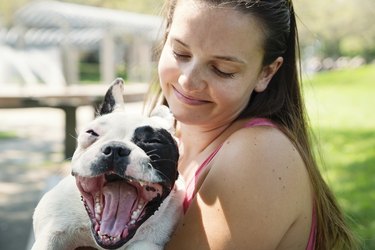Humans yawn when they are tired or bored, or when they see someone else yawning. But with dogs, yawning may seem a little more random. After all, they sleep a lot, so how can they be so tired? Your dog may yawn when you pet him, when he's trying to calm down a situation, when he's stressed out, or for a number of other reasons. Once you learn how dogs think and respond to us with their body language, the reason a dog yawns makes more sense.

Video of the Day
Excitement and anticipation
If your dog is yawning when you pet him, it's not because he's relaxed. It's because he's excited that you're giving him attention. He will also yawn when he's about to go for a walk or do anything else that's a fun activity for him, like playing fetch with you, running through the sprinklers, or going in the car. If you're taking a while to get ready for the walk or fun activity, you may notice that your dog's yawning increases. He's simply growing impatient and wants to get started already, so don't keep him waiting too long.
Video of the Day
Calming signals
Dogs may yawn as a calming signal or an appeasement gesture. With this type of signal or gesture, a dog is showing that he wants to calm down a situation, and he will communicate that with his body language. For example, if he is meeting a new dog that he is submissive to, he may yawn, tuck his tail between his legs, and avert his gaze.
In terms of how he interacts with you, he may yawn as a calming signal if you are mad at him. Maybe he chewed up your favorite shoe or had an accident on the rug, and he wants you to not yell at him for him. He will yawn to hopefully calm you down. If you are raising your voice, pointing at him, or otherwise preparing to scold him, watch out for that yawn as a way to relieve the tension in the room.
If you want to avoid a situation where your dog feels the need to use calming signals, there are a few steps you can take. For instance, you can go to the dog park when there aren't other dogs around, reward him for good deeds instead of punishing him for bad ones, and simply saying "uh oh" when he has an accident or messes up instead of raising your voice.

Stress
If your dog knows he's about to go to the vet, he gets freaked out by interacting with other dogs, he doesn't like being around children, or he's faced with any other stressful situation, he may yawn.
A stressful yawn will last longer and be a little more intense than, say, a human yawning when they are tired. If your dog is pacing around the room, whining, licking you excessively, and drooling while yawning at the same time, then you know he's under a lot of stress. To make your pup feel better, cuddle or pet him, talk to him in a soothing voice, give him his favorite toy or treat, or take him outside to get some exercise to relieve his anxiety.
Other reasons dogs yawn
Dogs may also yawn if they are confused. Maybe you're giving him mixed signals when you're training him, or trying to get him to do something that he doesn't yet know how to do. For instance, you could tell him "sit" before he actually knows what that command means. If he doesn't have a treat there that signals to him to sit, he won't be likely to do it, and he'll yawn instead.
Another reason dogs yawn is to handle a conflict. For instance, maybe he's really riled up and loving chewing on his toy, and you suddenly take it away from him. Rather than biting you – which he doesn't want to do – he will yawn.

Sometimes, dogs will yawn if they are facing a medical issue. If your dog is yawning frequently or in a situation in which yawning doesn't seem normal, you should contact your veterinarian right away. Dogs are excellent communicators; it's important that you are there to decipher the signals and get them help when they need it.
Is yawning contagious between dogs and humans?
Yawning is highly contagious: when one person does it, or even sees a picture of a human yawning, another person is likely to do it as well. But what about when your dog yawns? Can that make you yawn as well? The answer is yes, it can. The reason yawning is contagious is because it signals some primal social bonding or empathy. Since you and your pup have a special connection, he can absolutely make you yawn.
Dog body language
Aside from yawning, it's crucial to learn other types of dog body language so you can help your dog when he is in need or make him feel better. Knowing dog body language will also help you avoid bad situations like a dogfight.
For example, if you notice that your dog is panting or his mouth is open, then he is relaxed. If his mouth is tightly closed and/or he's panting rapidly, he could be afraid.
In terms of the ears, if they are out to the sides or slightly back, then your pup is relaxed. If they are titled forward and pointing, then your dog is excited.

A dog that's afraid will hold his tail between his legs, and a dog that is excited will shake his tail back and forth. In the latter scenario, the tail will rise above the spine level.
If your dog is afraid or is being submissive, he may lower his head. He may also give those classic puppy dog eyes, which he will usually show you when he knows he's done something wrong and he knows it.
A dog with raised hackles – or hair standing up on his back – is excited or upset. Usually, raised hackles will occur if your dog senses another dog is in the area. If your dog is prone to aggression toward other dogs, make sure you have a firm grip on his leash or collar in this situation. If your dog is shedding his hair, that means he is afraid or stressed.
Paying attention to your dog's body language and yawning behavior will help you not only understand him better, but ensure that he is comfortable in any and every situation he's in.